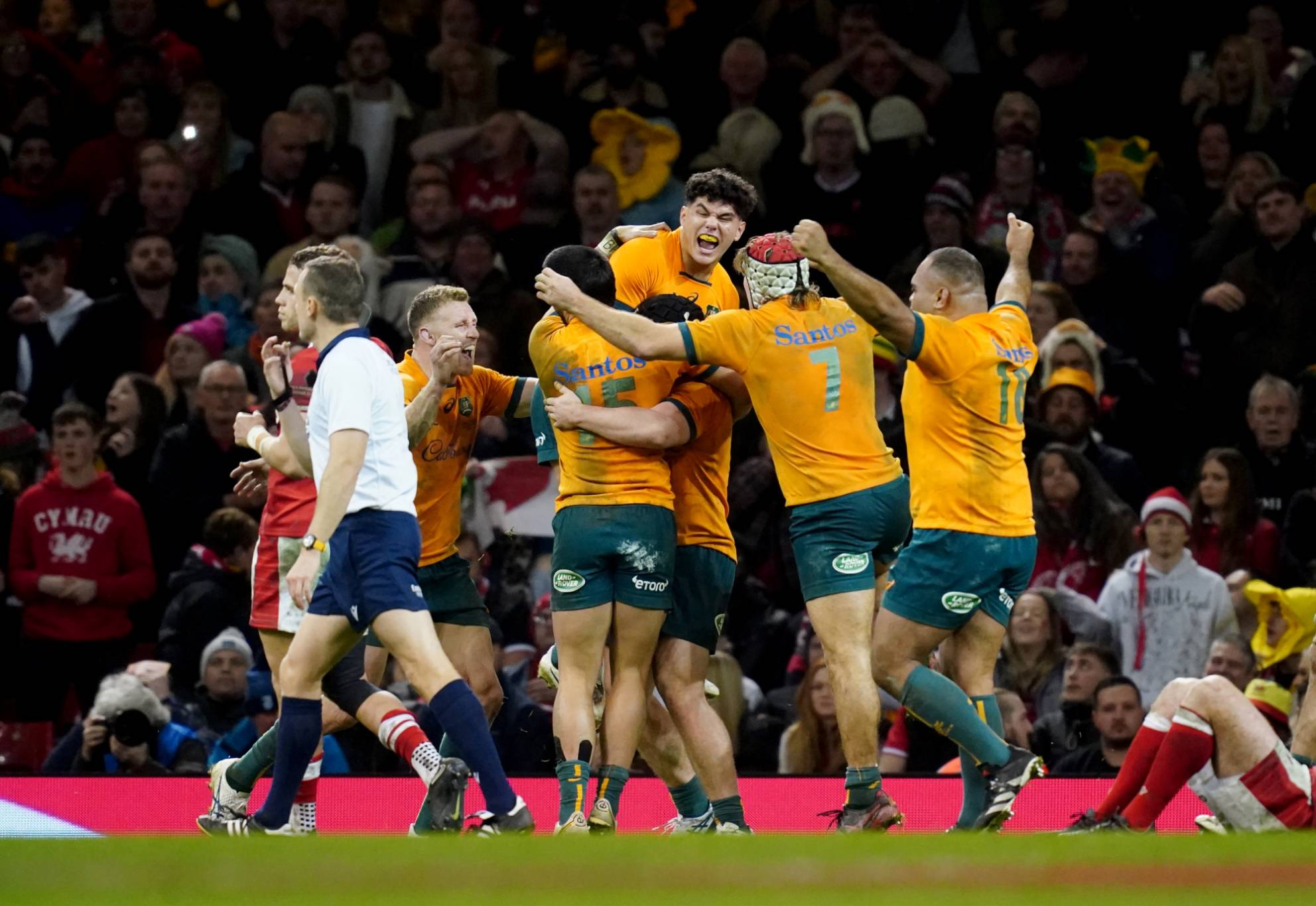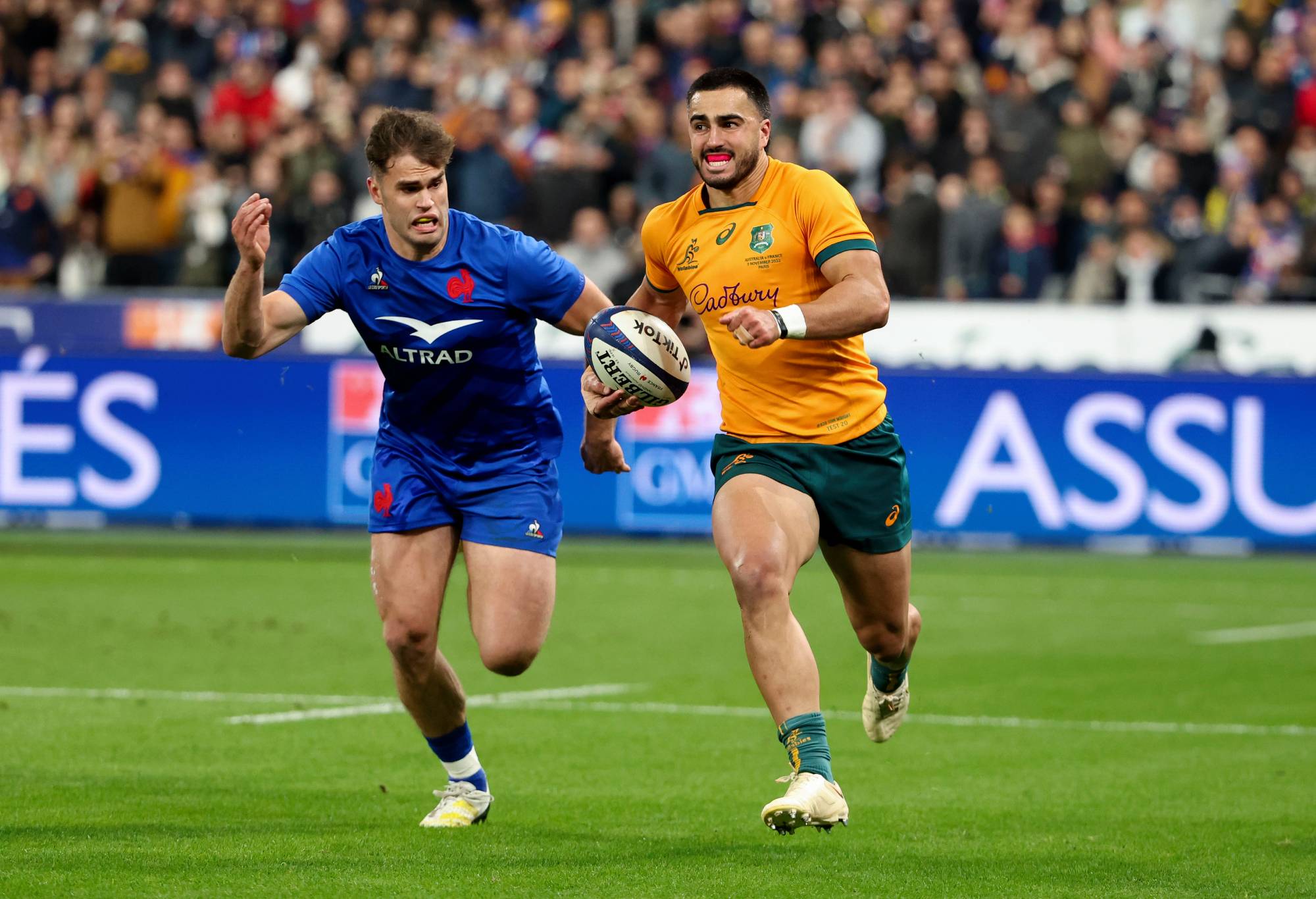CARDIFF – Dave Rennie couldn’t help but chuckle about the “bizarre Spring Tour” he presided over and the extraordinary final quarter of their fifth and final Test on tour, as the Wallabies stole a late, vital win against Wales.
In 80 minutes of helter-skelter action at the Principality Stadium, the Wallabies’ year was summed up perfectly as they overturned a 21-point deficit to silence the Welsh crowd and hold on 39-34.
Ill-discipline, yellow cards, injuries, coach-killing errors, moments of brilliance, character, and glimpses of hope were the themes of the game and, indeed, the entire year.
Put together, the Wallabies, who used 51 players throughout the international season, finished the year with five wins and nine defeats. That figure is not acceptable, no matter which way you try to spin it.
Sunday’s victory, however, was extraordinary given the numbers on the sidelines. On face value, it showed progress and the rich stocks of depth developing in the game Down Under.
As Rennie clarified to one Welsh journalist following the extraordinary comeback, the Wallabies had as many as 25 players of national interest unavailable either because of injury or overseas club commitments.
Yet, as one Rugby Australia official said following the game, “No one is high-fiving at RA.”
Harsh as it may sound, it is fair enough too.
After all, before the Wallabies left for France in late October, Rugby Australia CEO Andy Marinos had said three victories on the tour would be a “pass mark”.

Australia players celebrate at the final whistle after the Autumn International match at Principality Stadium, Cardiff. (Photo by David Davies/PA Images via Getty Images)
While Rennie’s men lost three matches by less than three points, including one-point defeats to France and Italy, the Wallabies have been the “nearly team” of international rugby ever since Jonny Wilkinson broke Australian hearts in 2003.
As Drew Mitchell astutely said on Stan Sport following the devastating one-point loss to France in Paris, where Damian Penaud showed his finishing ability to beat two Wallabies defenders to score with seconds remaining, narrow defeats must be analysed and scrutinised for what they are: losses.
Rennie did not dodge the issue either, with the third-year international coach finishing his press conference at the Principality Stadium by saying they needed results.
“It’s frustrating losing because we played really well in Paris, we played really well in Dublin, so we’ve got to find ways of winning those arm-wrestles, so nice to get one tonight,” Rennie reflected, having been asked to sum up the tour.
Curious selection calls
Although injuries continually stalled the Wallabies’ development and ability to build on continuity, curious selection by Rennie also played a role in the inability to build on combinations.
Take, for instance, Tom Wright’s season. The outside back missed selection for the first Test of the year in Perth but went on to play the next 13 matches. Yet, he was continually shifted between wing and fullback.
That’s not to say that Wright isn’t an option to wear the No.15 jersey at next year’s World Cup – he is, and the elusive nature of his game and the ball-playing option he provides is an attractive one – but if he was a serious option to play fullback this year, why not encourage his former Brumbies coach Dan McKellar, who is in his second season the Wallabies as their forwards coach, to play him more in the position in years gone by?
Similar eyebrows were raised when Andrew Kellaway played at fullback against the Irish less than a fortnight after Rennie said he saw the Rebels utility back more as a winger.

Tom Wright. (Photo by Jean Catuffe/Getty Images)
The playmaking issue was not helped by Quade Cooper’s injury, but the Wallabies seemed to be second-guessing themselves every time they selected Noah Lolesio. The Wallabies aren’t any closer to working out whether Lolesio is a serious World Cup option in part because of all the injuries but also because they returned to another overseas playmaker, Bernard Foley, for the second half of the year.
Then there was the rotation policy that Rennie used at halfback, with Nic White firming as a lock to leave Jake Gordon and Tate McDermott fighting for the second halfback role.
Building blocks for success
One thing has been proven – the Wallabies have character. They showed right throughout the year from Perth to San Juan, Melbourne to Cardiff, this is a side that rarely goes away – even when they have players dropping like flies.
“We’re a really tight group,” Rennie said. “It’s just great to show that on the park tonight under a bit of adversity.
“Even at half-time, we’ve got a yellow card and we know Slips (captain James Slipper) is not coming back on, we’ve been in that situation a number of times and we’ve fought through it. Things got worse for the next 15 or so minutes.
“The tour’s given us a chance to test people like Mark Nawaqanitawase and others to see how they deal with the pressure cooker, so I think from that point of view it’s been good for us.”
Allan Alaalatoa added: “Being in that position on the field, away from home, at the Principality Stadium against Wales, to come back and show that character, it’s huge. I’ll remember this game forever.”
Green shoots are undeniable
Indeed, the Wallabies did see the emergence of some talent.
Nawaqanitawase, who has given the Wallabies some real potency out wide and gone hunting for the ball, was not so much plucked out of thin air but more at the right time.
For two years the Junior Wallabies graduate was a turnstile in defence, but, off the back of some hard truths from new Waratahs coach Darren Coleman, went away, got stronger, developed into his frame and discovered that defence is as important as attack.
“We’ve been watching him for a while obviously,” Rennie explained.
“To his credit, he’s made massive shifts defensively. He’s always been a big man, great aerially; I just reckon the physical side of his game he’s made big shifts, much better post-tackle presence, work-ethic off the ball, and that to go with the quality skill-set that he has.
“His ability to adapt from Super Rugby into Test footy has been pretty seamless. In fact, he’s probably played better for us in the last three weeks than he has at Super level, so it’s a real credit to him. He hasn’t panicked or stressed about the step up.”
Nick Frost is another Test rookie who has succeeded from the word go.
The first-year Test forward offers something few second-rowers possess, at least in Australia, with his pace and height game-changing qualities.
Others like Fraser McReight and Jock Campbell were also afforded opportunities, which has showcased the depth in certain positions. Whether either goes to next year’s World Cup remains to be seen, particularly if further tweaks to the Overseas Selection Policy are made.
One big gamble
The great concern for the Wallabies is that 10 months out from the World Cup Rennie is relying on Quade Cooper returning from injury in time and delivering once again from the outset.
Somewhat concerningly though, he only played one Test this year and has to play against northern hemisphere opposition since his marvellous return in 2021, which came after a four-year Test hiatus.
Others like Samu Kerevi shape as key figures for next year’s World Cup, but an element of uncertainty still hovers over his giant figure in the midfield following his ACL injury.
Ditto Taniela Tupou, who was the fourth Wallaby to suffer a ruptured Achilles.
Putting the puzzle together
All things considered, the Wallabies can still mount a late run at next year’s World Cup.
As one former World Cup star astutely said, “the Wallabies have all the pieces of the puzzle, the question is whether they can put it together in time.”
It all starts with selection.
Rennie would benefit if the respective Super Rugby franchises jump on board.
Real clarity needs to be articulated on where they see their players of national interest playing in 2023 for the Wallabies, so they can get as much time as possible in the positions they will play.
That ranges from Wright and Kellaway at fullback at their respective Super Rugby franchises to whether Ben Donaldson is selected at No.10 at the Waratahs. And what role will Kurtley Beale, the livewire utility back, have at the Waratahs?
Significantly the Waratahs look set to have a strong year after making huge ground in 2022 and building on their squad for 2023. That could have a huge say in Wallabies selection for next year’s World Cup because it is easier to stand out in a winning side. On the other hand, the Reds have been rocked by Taniela Tupou’s season-ending injury while the Rebels will be without two of their best forwards. Good luck.
Stat that needs to change
Discipline, too, will have to be addressed for the Wallabies to stand a chance in 2023.
The Wallabies had 15 players sent to the sin bin and conceded one red card in 14 Tests – the most by a tier-one nation in 2022.
By comparison, next year’s World Cup favourites France, who went unbeaten in 2022, had just one card of any colour while world No.1 Ireland had just two yellow cards.
Despite the rocky road the Wallabies have travelled this year, Rennie’s men can still go deep at the World Cup. The generous draw the Wallabies have landed has helped, but now they must take advantage of it – something Australia has not done in a long, long time.






























































































